Extra Time with Leeza Mangaldas: Meet the rising stars of women’s football in India
If you read my column, it’s highly likely that you’re a fan of Indian football. But how much do you know about the India women’s team? In honour of Women’s Day this week, I decided to shift my spotlight from the men of the Hero Indian Super League (Hero ISL) for a moment, to shine it on our women in Blue.

Follow pitch-side reporter Leeza Mangaldas as she takes you behind the scenes this Hero ISL season. New posts every week exclusively on indiansuperleague.com. Connect with Leeza on Instagram or Twitter at @leezamangaldas.
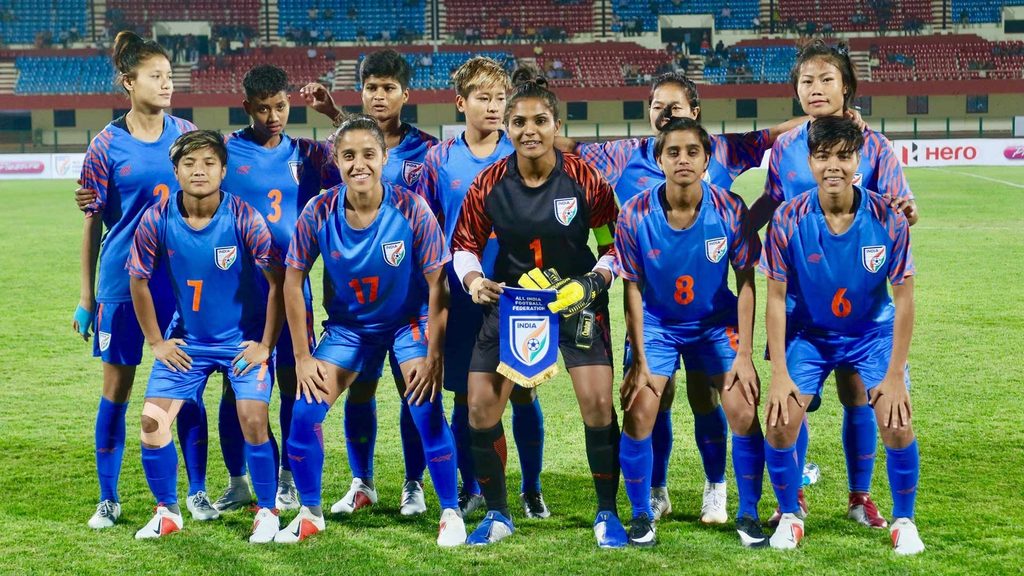 Meet our women in Blue. Back row: Sweety Devi, Jabamani, Indumathi, Anju, Dangmei Grace, Ashalata. Front row: Ratanbala, Dalima, Aditi, Sanju, Sangita
Meet our women in Blue. Back row: Sweety Devi, Jabamani, Indumathi, Anju, Dangmei Grace, Ashalata. Front row: Ratanbala, Dalima, Aditi, Sanju, SangitaIf you read my column, it’s highly likely that you’re a fan of Indian football. But how much do you know about the India women’s team? In honour of Women’s Day this week, I decided to shift my spotlight from the men of the Hero Indian Super League (Hero ISL) for a moment, to shine it on our women in Blue.
Indeed, the Indian women’s national football team has made significant strides in the last few months: it went past the first round of the Olympic qualifiers for the first time ever in November last year; it won all four of its friendlies during its recent tour of Hong Kong and Indonesia in January, and it just battered Turkmenistan 10-0 in a Turkish Cup match last week. The team also currently has a female coach: former India international, Maymol Rocky. Plus, it’s a squad bursting with young talent: the average age of its players is just a few months over 21 years.
Here are five of the team’s most promising youngsters who are busy shattering stereotypes and defying the odds, regardless of whether anyone is watching.
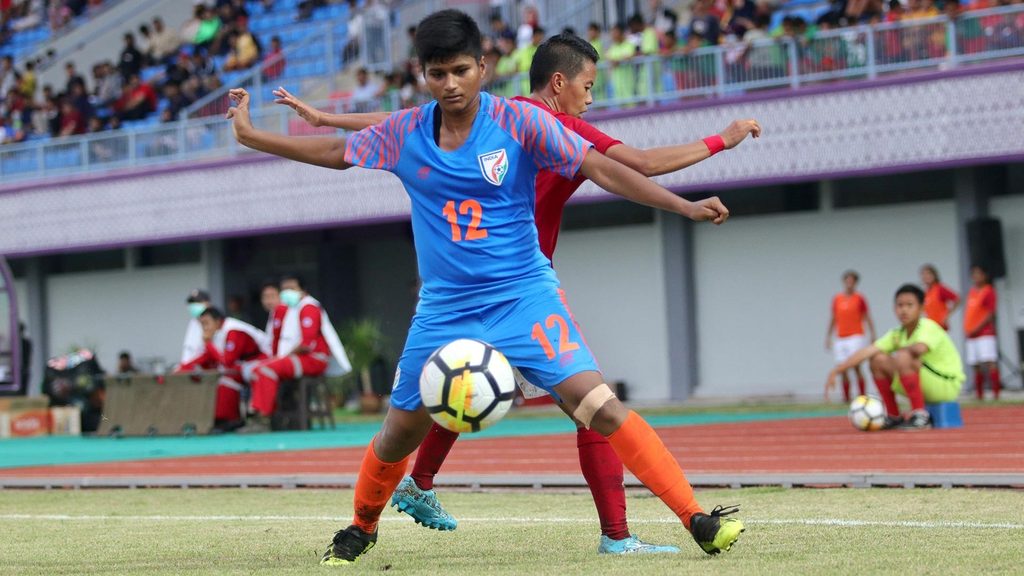 Indumathi Kathiresan in action
Indumathi Kathiresan in actionIndumathi Kathiresan
Indumathi’s awe-inspiring journey of resilience began literally in the eye of a storm. The daughter of a fisherman from coastal Tamil Nadu, the 2004 Indian ocean tsunami played havoc in her life. She went on to play for the Tamil Nadu Women’s team along with two other girls who had lost their families to the devastation. "We lost everything to the ocean," the young midfielder shared. "But football has helped us rebuild our lives and given us a new-found sense of purpose." A regular starter, Indumathi even captained India for the first time in their recent demolition of Turkmenistan and scored the solitary goal in India’s hard-fought win over Hong Kong in their second international friendly against the side earlier this year.
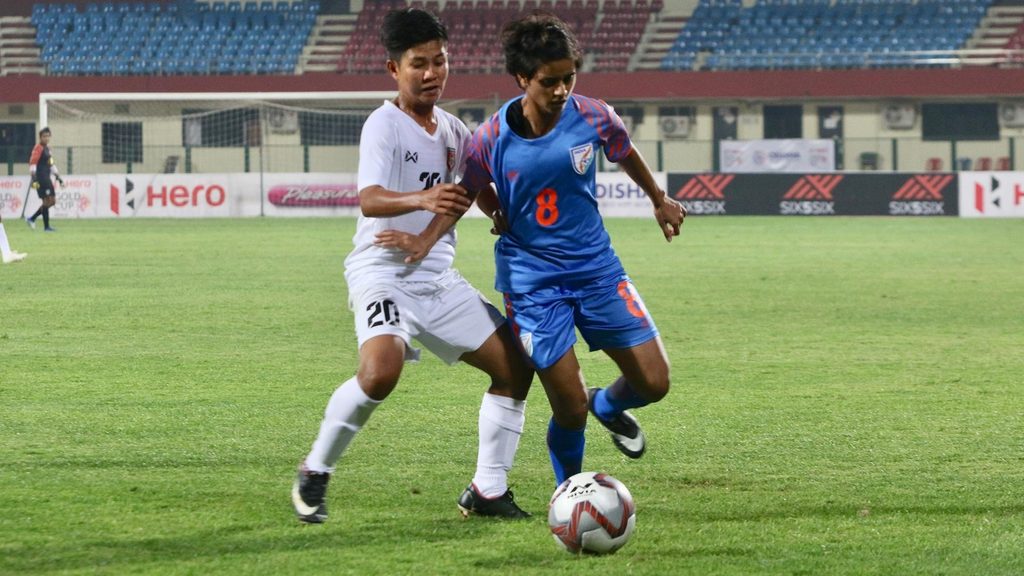 Sanju Yadav in action
Sanju Yadav in actionSanju Yadav
Sanju was born to a humble family in a village called Alakhpura in Haryana. While the state is famous for producing some of the country’s finest sportsmen, it is just as infamous for the oppressive social expectations it places on its women. But Sanju wasn’t afraid to challenge the gendered double standards of her local environment. In doing so, she has become a role model for football-loving Haryanavi girls who want to represent their country. She started playing football at age 10, in order to gain scholarships and money for her family, and has never looked back. Known for the positive attitude she brings to the pitch, she said she always likes to 'look at the glass half full', choosing to see opportunity in adversity. "The hardships I have faced have made me a better player — they’ve given me the physical and mental toughness I need both on and off the pitch," she shared. Last week, she scored a hat-trick in India’s 10-0 thumping of Turkmenistan in the Turkish Cup.
 Dangmei Grace in action
Dangmei Grace in actionDangmei Grace
Grace is the daughter of a pastor in rural Manipur, where football was everyone’s favourite sport. "Whenever I got a chance to sneak out from my house, I would rush to the fields nearby and play football. If there was nobody to play against, I practiced solo runs and dribbles. I had to play!" the 23-year-old said. One of the national team’s most reliable wingers, Grace scored three crucial goals during India’s five-match winning streak in the international friendlies earlier this year. She also won the Emerging Player award in the Indian Women’s League last year. "Fortunately, everyone from my village in Manipur is supportive of women playing football. In fact, they are the ones who have helped me reach where I am today," Grace shared. She scored a brace in their first friendly against Hong Kong this year which India won 5-2.
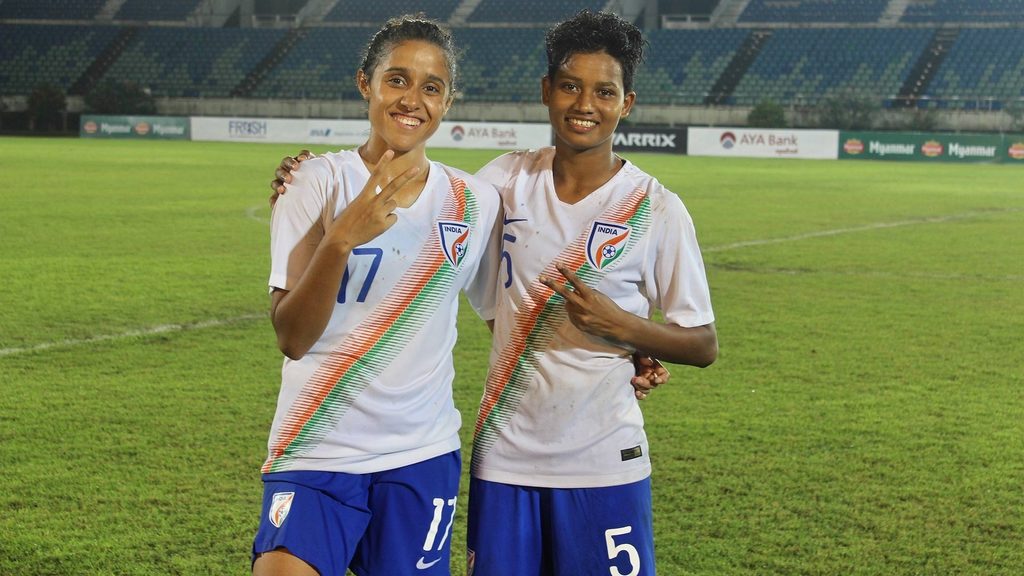 Dalima Chhiber and Jabamani Tudu
Dalima Chhiber and Jabamani TuduDalima Chhiber
21-year-old Dalima Chhiber is a Delhi girl who can play as a right back, a center back or a central mid fielder. She’s an avid Delhi Dynamos fan and was born into a family of sports enthusiasts: through her childhood, her dad was her coach. She has played for India Rush Soccer Club and FC Pune City in the Indian Women’s League (IWL) and has represented India in the U-14, U-16 and U-19 sides before playing for the senior national team. Outspoken about the need for better infrastructure and higher wages in women’s sport, she’s become a strong voice for Indian women looking to pursue football as a career.
“Football is still coming up in our country as cricket has always dominated,” she said. “Now, at least men’s football is being recognized. But for women’s football, the game is still coming up and will take time to grow. I hope more and more women will be able to see a future in professional football in India soon.”
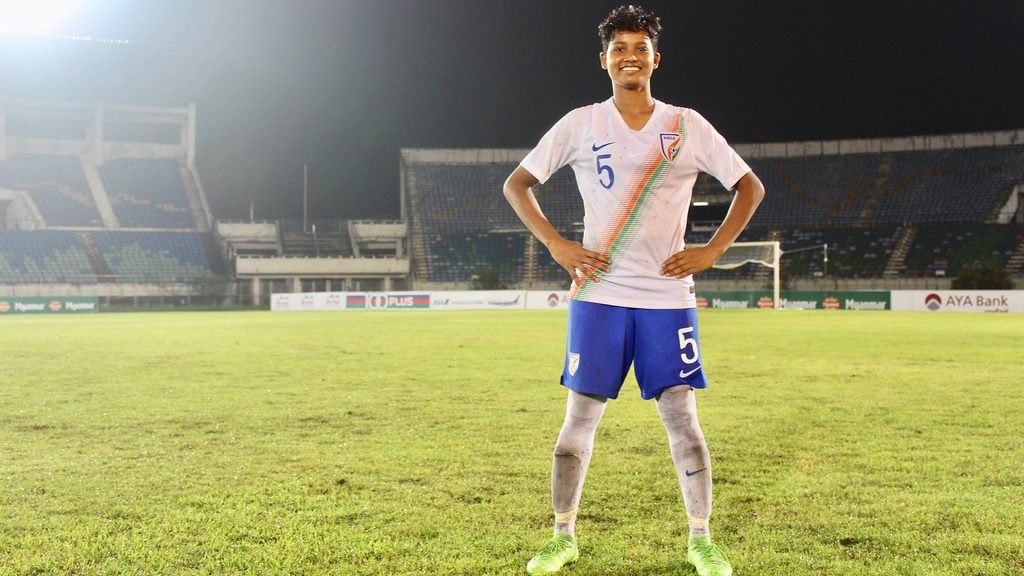 A jubilant Jabamani Tudu
A jubilant Jabamani TuduJabamani Tudu
Just 18 years old, Jabamani Tudu from Odisha is one of the youngest players on the team but she has already cemented her place in the starting XI and has even captained India, becoming one of the youngest players ever to do so. As a child, her parents did not want her to play sports, but she would sneak out and play football with the boys in her neighbourhood. It was only after she was selected for the state residential academy that her parents accepted her choice.
She made her debut for the senior national team when she was only 16-years-old and has been a vital cog for the squad ever since. A skilful and versatile player, she plays as a forward for her state team and as a left back for the national team. She won the Emerging Player award in the inaugural season of the Indian Women’s League (IWL 2017) and was part of the Rising Students Club that won the title last year.
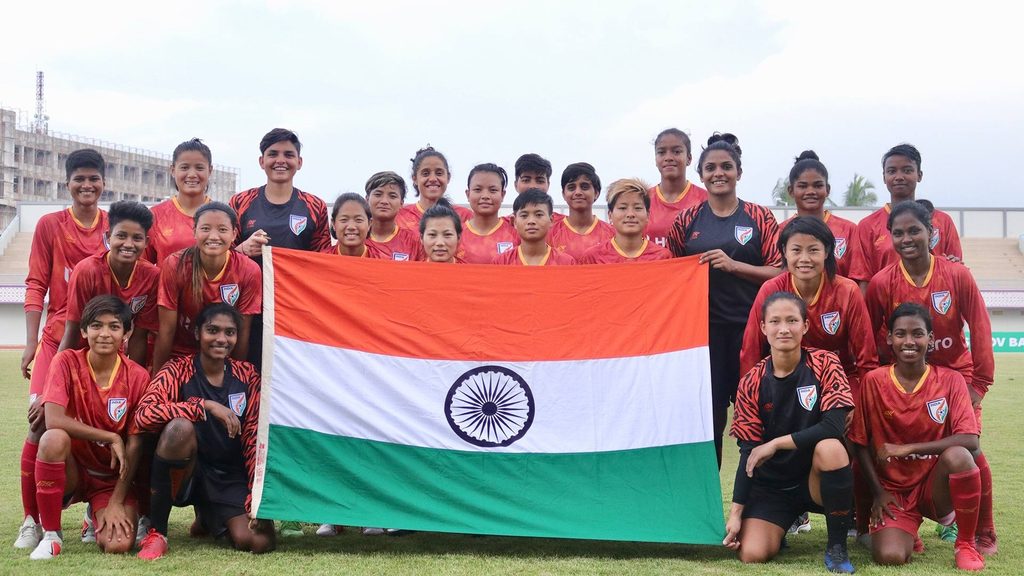 The India Women’s National Team poses with the tricolour
The India Women’s National Team poses with the tricolourPopularizing and improving women’s sport in India can seem like an uphill battle given the complex combination of patriarchal social attitudes and infrastructural challenges that have long stood in its way, but that’s exactly why we’ve all got to keep at it. Hopefully, these stories of the youngsters making a mark on the women’s national team will inspire you to follow their journeys and cheer them on. Even simply by watching women’s sport and supporting women’s teams, you too can help be part of the change!

























